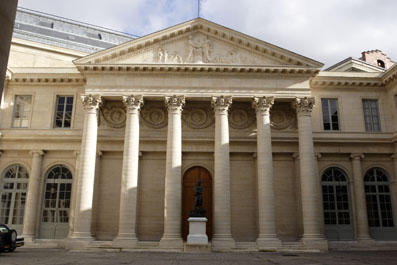Difference between revisions of "Language/French/Culture/Education"
(- word order, bad spelling, some important words are missing for better understanding) Tags: Mobile edit Mobile web edit Visual edit |
|||
| Line 1: | Line 1: | ||
[[File:french_university_paris.jpg|400px]] | [[File:french_university_paris.jpg|400px]] | ||
The French | The French educational system is said to be one of the most successful in the world. Education is compulsory in France from the age of 6 to 16, but a large majority of children often start school at the age of 2. | ||
==Ecole Maternelle (kindergarten)== | ==Ecole Maternelle (kindergarten)== | ||
Ecoles Maternelles take pupils from age 2 to | Ecoles Maternelles take pupils from the age of 2 to 6 and prepare them for the entry to a primary school. | ||
==Ecole primaire (primary school) == | ==Ecole primaire (primary school) == | ||
| Line 18: | Line 18: | ||
==Collège (Middle school) == | ==Collège (Middle school) == | ||
There are four levels, normally for pupils aged 11 - 15. The four classes, corresponding to grades 6 to 9, are called sixième, cinquième, quatrième and troisième. | |||
==Lycée (High School) == | ==Lycée (High School) == | ||
| Line 27: | Line 27: | ||
===The baccalauréat=== | ===The baccalauréat=== | ||
The baccalauréat is a unitary exam, that pupils pass or fail. It is impossible to pass in one subject and fail in | The baccalauréat is a unitary exam, that pupils either pass or fail. It is impossible to pass in one subject and fail in another ones. The only mark that counts is the final weighted average, which must be at least 10/20 for a pupil to pass. | ||
===Grading=== | ===Grading=== | ||
Grading in the French education system is standardized. All marks or grades are out of twenty, and the pass mark is 10/20. | Grading in the French education system is standardized. All marks or grades are out of twenty, and the pass mark is assign to those who have at least 10/20. | ||
France has a dual university system : the "Universités" and the "Grandes Ecoles". | France has a dual university system : the "Universités" and the "Grandes Ecoles". | ||
| Line 38: | Line 38: | ||
==Grandes Ecoles== | ==Grandes Ecoles== | ||
After High School, the best students apply to "Classes préparatoires" to prepare | After High School, the best students can apply to "Classes préparatoires" to prepare themselves within 2 or 3 years for the "Grandes Ecoles" : Ecoles d'Ingénieurs (Sciences), to Business Schools. | ||
Please | Please do not hesitate to edit this article if you think it needs improvements. | ||
[[Category:Education]] | [[Category:Education]] | ||
Revision as of 15:02, 11 October 2016
The French educational system is said to be one of the most successful in the world. Education is compulsory in France from the age of 6 to 16, but a large majority of children often start school at the age of 2.
Ecole Maternelle (kindergarten)
Ecoles Maternelles take pupils from the age of 2 to 6 and prepare them for the entry to a primary school.
Ecole primaire (primary school)
Five classes, ages 6 to 11.
There are five levels:
- Cours préparatoire (CP) or 11ème – age 6 to 7 years old
- Cours élémentaire (CE1) or 10ème – age 7 to 8 years old
- Cours élémentaire (CE2) or 9ème – age 8 to 9 years old
- Cours moyen 1 (CM1) or 8ème – 9 to 10 years old
- Cours moyen 2 (CM2) or 7ème – 10 to 11 years old
Collège (Middle school)
There are four levels, normally for pupils aged 11 - 15. The four classes, corresponding to grades 6 to 9, are called sixième, cinquième, quatrième and troisième.
Lycée (High School)
The traditional French lycée covers the last three years of secondary education. There are two main types of traditional lycée, the lycée général or lycée classique, and the lycée technique.
The main function of the lycée is to prepare pupils to take the "baccalauréat" (or "bac") exam. The three classes (grades 10 to 12) are known as seconde, première and terminale.
The baccalauréat
The baccalauréat is a unitary exam, that pupils either pass or fail. It is impossible to pass in one subject and fail in another ones. The only mark that counts is the final weighted average, which must be at least 10/20 for a pupil to pass.
Grading
Grading in the French education system is standardized. All marks or grades are out of twenty, and the pass mark is assign to those who have at least 10/20.
France has a dual university system : the "Universités" and the "Grandes Ecoles".
Universités
France has 82 state universities and 5 Catholic universities and a large number of private "institutes".
Grandes Ecoles
After High School, the best students can apply to "Classes préparatoires" to prepare themselves within 2 or 3 years for the "Grandes Ecoles" : Ecoles d'Ingénieurs (Sciences), to Business Schools.
Please do not hesitate to edit this article if you think it needs improvements.
